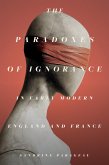Dieser Download kann aus rechtlichen Gründen nur mit Rechnungsadresse in A, B, BG, CY, CZ, D, DK, EW, E, FIN, F, GR, HR, H, IRL, I, LT, L, LR, M, NL, PL, P, R, S, SLO, SK ausgeliefert werden.
"Jouni-Matti Kuukkanen's Postnarrativist Philosophy of Historiography is a major work in the philosophy of history, one that seeks to conceive historiographies not as concerned to represent ('re-present') the past but rather to propose ways of regarding it ... Kuukkanen's book tries to get philosophers of history out of the cave, first by showing them that they are in fact in a cave, and then by showing them the sun outside." (Brian Fay, Journal of the Philosophy of History, Vol. 11, 2017)
"In his recent book, Jouni-Matti Kuukkanen presents an original postnarrativist philosophy of history ... . His postnarrativism is an ambitious project deserving close attention. ... There is no doubt that his inspiring emphasis on the argumentative nature of history is going to attract many readers and, hopefully, motivate further research." (Eugen Zelenák, Journal of the Philosophy of History, Vol. 11 (2), 2017)
"Jouni-Matti Kuukkanen has written an important book. It directly confronts a key theoretical dilemma that has shadowed debate in historiography for several decades: histories cannot be written without using some narrative structure or other, but epistemological evaluation cannot be applied to narratives qua narrative. ... Kuukkanen deserves great credit for attempting to reshape a long-stalled debate in a way that enables the theoretical options to be imagined anew." (Paul A. Roth, History and Theory, Vol. 55, May, 2016)
"I recommend this text. It is lucid and honest in its analysis. It is the kind of text that clearly explicates its arguments and assumptionsabout how the past and history can be regarded as - in effect - the same thing. The author expends useful time in the Introduction explicating the distinction between historiography (writing history) and history (defined as past events)." (Alun Munslow, Rethinking History, September, 2015)
"... Insgesamt hat Kuukkanen ein innovatives Buch zu einer gerade stattfindenden theoretischen Entwicklung vorgelegt, das für theoretisch interessierte Historiker/innen wie auch für Wissenschaftsphilosoph/innen von Interesse sein sollte. ... Der klare Aufbau und die analytische Sprache des Buchs können für seine weitere kritische Diskussion fruchtbar sein ..."









